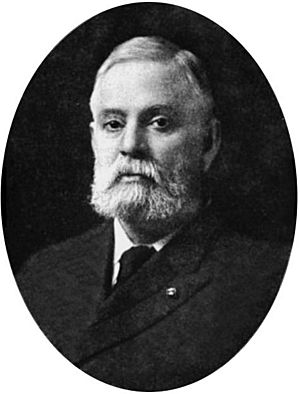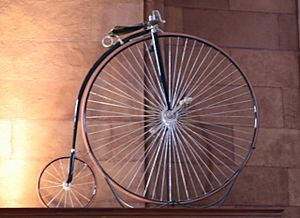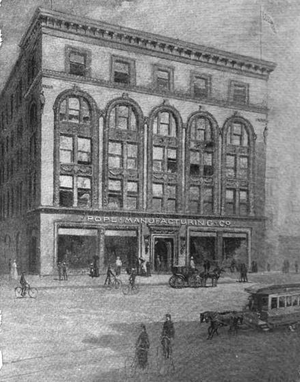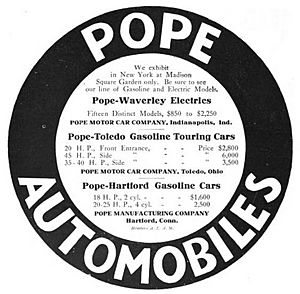Albert Augustus Pope facts for kids
Quick facts for kids
Col. Albert A. Pope
|
|
|---|---|
 |
|
| Born | May 20, 1843 |
| Died | August 10, 1909 (aged 66) Lindermere-by-the-Sea, Cohasset, Massachusetts
|
| Occupation | importer, manufacturer |
| Known for | Pope Manufacturing |
| Title | Colonel |
| Spouse(s) | Abbie Linder |
| Parent(s) | Charles and Elizabeth Bogman Pope |
| Relatives | (siblings) Charles, Adelaide, Emily, Caroline (aka Augusta), Arthur, and Mary |
| Signature | |
Albert Augustus Pope (born May 20, 1843 – died August 10, 1909) was an important American businessman. He was known for bringing bicycles to the United States and later for making early automobiles. During the American Civil War, he served as an officer in the Union Army and earned the honorary title of Brevet Lieutenant-Colonel.
Contents
Albert Pope's Early Life
Albert Pope was born in Boston, Massachusetts, on May 20, 1843. His parents were Charles and Elizabeth Pope. His family had been in the timber business for a long time. However, his father, Charles, decided to buy and sell land instead.
Around 1845, Albert's father started buying land in Brookline, Massachusetts, a town near Boston. He moved his family there in 1846. He bought more land, especially in areas that were getting streetcar access. He sold these properties for a good profit. But by 1851, his land deals caused him financial trouble.
The family story says that Albert's father never fully recovered financially. Albert started working at a young age to help his family. At nine years old, he plowed fields and sold produce. By age fifteen, he worked at Quincy Market and later as a store clerk. Some historians believe his family connections also helped him succeed. They suggest he left school early because he saw a faster way to get ahead on his own.
Serving in the Civil War
When he was nineteen, Albert Pope joined the Union Army on August 27, 1862. He became a Second Lieutenant in the 35th Massachusetts Volunteer Regiment. Just ten days later, his unit fought in the fierce Battle of Antietam. Many men from his unit died that day.
Pope survived a serious illness called cholera. His unit also fought in other major battles, including Fredericksburg, Vicksburg, and Knoxville. He left the army as a Captain. He also received the honorary title of Brevet Lieutenant-Colonel for his brave service. This title was an honor and did not come with extra power or pay.
Life After the War
After the war, Albert Pope used his military savings to invest in a business that supplied shoemakers. This investment quickly grew, making him a lot of money. Even though he left school early, he helped pay for his three younger siblings to go to college.
- His twin sisters, Emily and Augusta, became doctors. They studied in Europe and practiced at the New England Hospital for Women and Children. In 1886, they were accepted into the Massachusetts Medical Society.
- His youngest brother, Louis, became a minister.
In 1868, Albert adopted his seven-year-old nephew, Harry, after his older brother Charles died.
On September 20, 1871, Albert married Abbie Linder. They had four sons and one daughter. Albert continued to expand his business. He became involved in making air pistols, cigarette rollers, and shoe parts.
The Bicycle Years
Albert Pope became very important in the history of bicycles in America.
Bringing Bicycles to America
In 1875, Albert Pope was elected to the Newton Common Council. The next summer, he visited the Philadelphia Centennial Exhibition. There, he saw English "ordinary bicycles," also known as penny-farthings. These bicycles had a very large front wheel and a small back wheel.
In 1877, an English bicycle maker named John Harrington visited Pope. Harrington built a bicycle and taught Pope how to ride it. Pope was very impressed. He decided to import eight "Excelsior Duplex" bicycles from England. He received them in January 1878 and started advertising them.
Pope invested over $4,000 to import about fifty bicycles. In May 1878, he began looking into making his own bicycles. He met with George Fairfield, the president of Weed Sewing Machine Company in Hartford, Connecticut. Pope rode one of his imported bicycles from the train station to the Weed factory. He asked Fairfield if Weed could make fifty copies of the bicycle. Fairfield agreed. These bicycles were finished in September 1878 and were the first ones Pope sold under the Columbia brand. He managed his new bicycle business from his Pope Manufacturing Company office in Boston.
In 1878, Pope sold about 92 bicycles (both imported and Columbia bikes). In 1879, he sold about 1,000 Columbia bicycles. The demand for his bikes was so high that he couldn't make them fast enough. The Weed factory started improving the design, creating new models like the "Special" and "Standard."
Controlling Bicycle Patents
Albert Pope became very powerful in the bicycle industry by controlling important patents. Patents are legal rights that protect inventions. Two American companies already had control over some bicycle patents. Pope managed to buy a controlling share of these patents. He also invested in many other patents related to bicycle production.
He would sue other bicycle makers for using his patented ideas. Then, he would agree to drop the lawsuits if they paid him a fee, usually $10 for each bicycle they made. This meant that nearly every bicycle manufacturer in the U.S. had to pay Pope money.
Promoting Bicycles and Cycling
Pope spent a lot of money, at least $8,000, to promote bicycles and cycling. Some local governments tried to ban or limit bicycle use. Pope saw this as a threat to his business.
For example, in 1880, New York City banned bicycles in Central Park. Pope arranged for three cyclists to ride into the park to challenge the law. He promised to pay their legal fees. Even though the cyclists lost their cases, Pope kept his promise to support them.
Pope, along with his brother Arthur and cousin Edward, helped start the Massachusetts Bicycle Club.
By the early 1890s, Pope had created a "bicycle trust." This meant he controlled the main bicycle patents in the U.S. His Columbia bicycle brand became very famous. During the "bicycle craze" of the mid-1890s, Pope was making about 250,000 bicycles every year!
A big problem for cyclists at this time was the lack of good roads. Since Pope was both a bicycle maker and a rider, this bothered him a lot. He helped create the League of American Wheelmen and the Good Roads Movement. These groups worked to convince governments to build better roads for everyone.
Entering the Automobile Business
Columbia Automobile Company
Starting in 1896, Albert Pope began to make automobiles. He hired Hiram Percy Maxim as the chief engineer for his Pope Motor Carriage department. In 1897, this department became a separate company called the Columbia Automobile Company. Pope was also an investor in another company, the Electric Vehicle Company, which later bought Columbia Automobile Company.
By 1899, Pope's company had made over 500 electric vehicles in Hartford, Connecticut.
Pope tried to get back into making cars in 1901 by buying several smaller companies. However, this was expensive, and there was a lot of competition in the car industry.
Between 1903 and 1915, Pope's company operated several different automobile brands, including:
- Pope-Hartford (1903–1914)
- Pope-Robinson
- Pope-Toledo (1903–1909)
- Pope-Tribune (1904–1907)
- Pope-Waverly
Pope faced financial difficulties and declared bankruptcy in 1907. He stopped making automobiles in 1915.
Albert Pope is known for being one of the first car manufacturers to use mass production methods. In 1900, his factories in Hartford made more motor vehicles than any other factory in the world.
Images for kids
Death and Legacy
Albert Pope died on August 10, 1909. He is buried in the Forest Hills Cemetery and Crematory in Jamaica Plain, Massachusetts.
After his death, some of his companies joined the United States Motor Company. However, Pope's business empire eventually collapsed in 1913. He also founded Pope Park, Hartford, Connecticut and gave it to the city.
Pope Companies
- Pope Manufacturing Company
- American Bicycle Company
See also
 In Spanish: Albert Augustus Pope para niños
In Spanish: Albert Augustus Pope para niños
 | Delilah Pierce |
 | Gordon Parks |
 | Augusta Savage |
 | Charles Ethan Porter |











